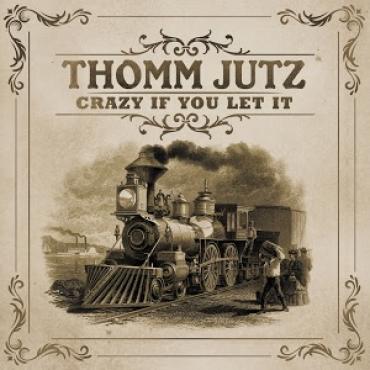Thomm Jutz’s Time and Place

In the daily grind of living through American anxiety, even music is not always a guaranteed respite. Thomm Jutz’ new album Crazy If You Let It is a welcome antidote, as if it were made to help us cope through the crazy times.
Jutz, the unassuming German born Nashville transplant, has been quietly dominating the bluegrass charts, often with writing partner Milan Miler, while amassing production credits coming out of his TJ Tunes studio.
Somewhat immune to promoting his own solo career, he issued Volunteer Trail unofficially last year, making it available only at shows. Now with Crazy If You Let It, Jutz puts a stake in the ground to call attention to his formidable talents.
The album is built around the core band Jutz and Peter Cooper assembled to make Mac Wiseman’s I Sang The Song, arguably one of the year’s best albums. In addition to Jutz, it includes bassist Mark Fain, Sierra Hull on mandolin and Justin Moses on banjo, fiddle and fiddle.
The intimate small ensemble playing is accentuated by Jutz’s exquisite guitar parts and innate gift of narrative. “There is so much beauty in the world,” Jutz muses earnestly on the title track, an affirmation and meditation of perseverance he co-wrote and harmonizes with Andrea Zonn.
If Jutz lulls you (with co-writer and harmony singer Tammy Rogers) into a beautiful reverie about steam trains on “Old Railroads,” he’s just as apt to kick things into gear with “Crossing Over Black Mountain” and the romp of “White Water Train.” The band picks its way through the bluesy riffing party of “Atlanta (Please Don’t Let Me Down”) co-written with Jon Weisberger and inspired by a photo of Charley Pride. In “Run With The Horses,” another co-write with Charley Stefl, the band is seductively understated as it builds the song’s gripping and foreboding tension in this Old Testament retelling.
The album is steeped in rich historical details. The songs provide a travelogue borrowing from myriad geographic settings and Jutz’s penchant for identifying random details for writing. In the generous annotations on the liner notes, Jutz provides a window into the context for inspiration. It’s a window into a collection of songs that welcomingly transports you in time and place.



